|
What do Juan Fangio, Mike Hawthorn and John Surtees have in common? It turns out that they all won their Ferrari World Championships in the last race of the season and could not have done so without the help of their teammates. Is history about to repeat itself at Suzuka?
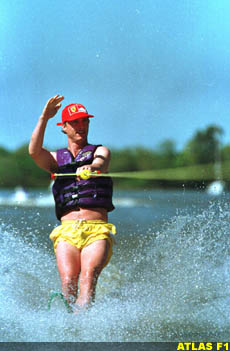 While the Formula One world is understandably focused on Michael Schumacher's challenge to points-leader Mika Hakkinen as the season moves inexorably toward the Showdown at Suzuka, the history of Scuderia Ferrari suggests that it is Schumacher's teammate Eddie Irvine who is the linchpin to Michael's championship hopes: if Schumacher is on pace and Irvine delivers, Schumacher can win the championship. While the Formula One world is understandably focused on Michael Schumacher's challenge to points-leader Mika Hakkinen as the season moves inexorably toward the Showdown at Suzuka, the history of Scuderia Ferrari suggests that it is Schumacher's teammate Eddie Irvine who is the linchpin to Michael's championship hopes: if Schumacher is on pace and Irvine delivers, Schumacher can win the championship.
The cold, hard, statistical fact is that Hakkinen's four-point cushion over Schumacher means that if Hakkinen wins or finishes second at Suzuka, he will win the 1998 World Championship. But all is not lost and there is still a good chance that Schumacher could emerge victorious if Irvine is up to the occasion.
Surprisingly, given Ferrari's legendary status, Ferrari drivers have become World Champion only nine times since the current World Championship system began in 1950. Alberto Ascari's titles in 1952 and 1953 were walkovers; so too were Niki Lauda's Ferrari championships in 1975 and 1977. Jody Scheckter had his 1979 championship (Ferrari's last) sewn up by Monza, with two races left on the calendar. And in 1961, Ferrari dominated the season, with Wolfgang von Trips and Phil Hill finishing 1-2 in the points and Phil Hill winning the championship at Monza after the fatal accident of von Trips. Ferrari did not even compete in the last race of the 1961 season, the United States Grand Prix at Watkins Glen.
The other three times a Ferrari driver has won the championship, it has only been accomplished in the last race of the season and with the help of Ferrari teammates, precisely the situation now facing Ferrari at Suzuka. Can the combined strategic talents of Luca di Montezemolo, Jean Todt and Ross Brawn repeat the team successes achieved under Enzo Ferrari?
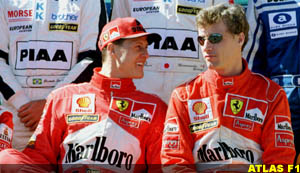 In 1956, the Italian Grand Prix at Monza was the last race; in those days the races lasted three hours and, as it turned out, all three of those hours and five Lancia-Ferrari D50A's were needed by Fangio to win the title. Mercedes teammates from 1955, Stirling Moss and Juan Fangio, found themselves on separate teams for 1956 after Mercedes had withdrawn from racing following the 1955 LeMans disaster. Fangio joined Ferrari, which was running Lancia-Ferrari's at the time, and Moss joined Maserati and drove the Maserati 250F. In 1956, the Italian Grand Prix at Monza was the last race; in those days the races lasted three hours and, as it turned out, all three of those hours and five Lancia-Ferrari D50A's were needed by Fangio to win the title. Mercedes teammates from 1955, Stirling Moss and Juan Fangio, found themselves on separate teams for 1956 after Mercedes had withdrawn from racing following the 1955 LeMans disaster. Fangio joined Ferrari, which was running Lancia-Ferrari's at the time, and Moss joined Maserati and drove the Maserati 250F.
Moss did everything asked of him that day at Monza to win the 1956 World Championship: indeed, at one point, Moss had run out of fuel fighting off the Lancia-Ferraris and had been nudged back to the pits for refueling by his Maserati teammate Piotti and he still won the race, regaining first place toward the end of the race following the misfortunes of others.
Meanwhile, the Lancia-Ferraris also had a peck of trouble, derived principally from a poor quality run of Englebert tires being used by Ferrari and the pounding the cars and the tires had taken on the Monza banking. Fangio's car suffered a broken steering arm and needed time-consuming repairs that meant he was not going to win the race in that car. Most of Fangio's other teammates were also experiencing tire punctures and related mechanical problems.
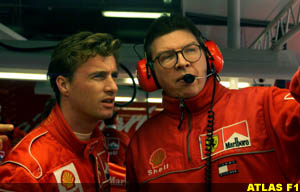 Of the Lancia-Ferraris still running well, Luigi Musso was running in first place due to Moss's refueling stop but declined to turn over his car to Fangio (to be fair to Musso, he had already given his car to Fangio once that year in Fangio's home Grand Prix in Argentina, which Musso/Fangio won); only Fangio's English teammate, Peter Collins, himself a rival for the drivers' title and then in third place, could help, and in the ultimate act of sportsmanship, Collins turned over his car to Fangio who went on to finish second to Moss's Maserati and win the 1956 World Championship. Of the Lancia-Ferraris still running well, Luigi Musso was running in first place due to Moss's refueling stop but declined to turn over his car to Fangio (to be fair to Musso, he had already given his car to Fangio once that year in Fangio's home Grand Prix in Argentina, which Musso/Fangio won); only Fangio's English teammate, Peter Collins, himself a rival for the drivers' title and then in third place, could help, and in the ultimate act of sportsmanship, Collins turned over his car to Fangio who went on to finish second to Moss's Maserati and win the 1956 World Championship.
In 1964, Jim Clark, Graham Hill and John Surtees all had a statistical chance to win the World championship as they entered the last race of that season, the Grand Prix of Mexico, held in Mexico City. In that race, Lorenzo Bandini was in the Eddie Irvine role and proved up to it.
Surtees qualified a disappointing fourth; Lorenzo Bandini's Ferrari qualified third, with Clark's Lotus on pole and Dan Gurney beside him in a Brabham-Climax qualifying second. As the race unfolded, Clark took and kept the lead as he was wont to do, leading 63 of the 65 laps. Bandini's first accidental gift to Surtees was getting into an incident with Graham Hill, which spun Hill and left the BRM with a damaged exhaust pipe, no doubt contributing to Hills' finish in eleventh place. Meanwhile, Clark's relatively new Lotus 33, having been out front all day, ran out of oil and seized up on the last lap, dropping Clark to fifth place and giving the lead to Gurney, the ultimate winner. After all this had happened, Bandini found himself running second and graciously waved Surtees by, permitting Surtees to take second place and win the title over Hill and Clark. The time charts for that race show that Bandini wanted us all to know the significance of his role: Surtees finished the race 0.7 of a second ahead of Bandini.
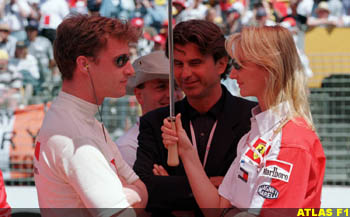 Mike Hawthorn won his 1958 World Championship under circumstances similar to Surtees. The Moroccan Grand Prix in Casablanca was the last race of the season. Again, Stirling Moss had done his utmost to be in a position to win, this time in his Vanwall: he set fastest lap and won the race notwithstanding the shadow cast over the race by the fatal accident of fellow Vanwall teammate Stuart Lewis-Evans 12 laps before the end of the race. Phil Hill's Ferrari had only qualified fifth but ran well throughout the race and was ahead of his Ferrari teammate Hawthorn who had been on pole. The 'move over' team orders came down from the Commendatore and Phil Hill let Hawthorn by into second place, which was good enough for Hawthorn to beat Moss by one point for the 1958 Championship. Mike Hawthorn won his 1958 World Championship under circumstances similar to Surtees. The Moroccan Grand Prix in Casablanca was the last race of the season. Again, Stirling Moss had done his utmost to be in a position to win, this time in his Vanwall: he set fastest lap and won the race notwithstanding the shadow cast over the race by the fatal accident of fellow Vanwall teammate Stuart Lewis-Evans 12 laps before the end of the race. Phil Hill's Ferrari had only qualified fifth but ran well throughout the race and was ahead of his Ferrari teammate Hawthorn who had been on pole. The 'move over' team orders came down from the Commendatore and Phil Hill let Hawthorn by into second place, which was good enough for Hawthorn to beat Moss by one point for the 1958 Championship.
With this as prologue, what is the likelihood that Eddie Irvine will follow in the footsteps of his Famous Ferrari Forbears and become the midwife capable of delivering the 1998 World Championship to Michael Schumacher? To begin with, Eddie says Suzuka is his favorite track; he lived and raced successfully in Japan prior to coming of age in Formula One and last year's race in Japan where he delivered Schumacher a much needed win, certainly augurs well for a repeat performance of team tactics. He also has the distinction of being punched by the late Ayrton Senna at Suzuka in 1993 when Irvine presumptuously attempted to unlap himself from Senna in Eddie's first race with Jordan, so clearly he is Eddie At The Ready when it comes to fighting things out at Suzuka. And unlike Fangio's teammate Musso, Eddie has almost cheerfully (and always dutifully) given up places he had earned to Michael all year long, most obviously when he gave up a podium third place finish to Michael in Austria this year by feigning fading brakes.
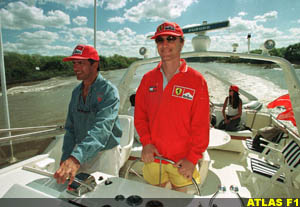 To be sure, the forces of darkness are arrayed against Ferrari. Like the flawed bursting Englebert tires used by the Lancia-Ferraris at Monza in 1956, the quality of Schumacher's Goodyear tires have been sporadic and suspect all year, leading to the occasional vituperative outburst by Schumacher against Goodyear. Since Bridgestone/Firestone are Japanese-owned and use Suzuka for testing, the home court advantage has to go to Bridgestone. On the other hand, Michael Schumacher won at Suzuka in 1995 (in a Benetton) and 1997 (in a Ferrari) so he and Eddie both know their way around the Suzuka track; McLaren has not won at Suzuka since 1993 when Senna won. To be sure, the forces of darkness are arrayed against Ferrari. Like the flawed bursting Englebert tires used by the Lancia-Ferraris at Monza in 1956, the quality of Schumacher's Goodyear tires have been sporadic and suspect all year, leading to the occasional vituperative outburst by Schumacher against Goodyear. Since Bridgestone/Firestone are Japanese-owned and use Suzuka for testing, the home court advantage has to go to Bridgestone. On the other hand, Michael Schumacher won at Suzuka in 1995 (in a Benetton) and 1997 (in a Ferrari) so he and Eddie both know their way around the Suzuka track; McLaren has not won at Suzuka since 1993 when Senna won.
Apart from Bridgestone's edge in the tire wars, the seemingly bullet-proof McLaren Mercedes team is another formidable obstacle to a Ferrari win. But the statistics show that Ferrari has been amazingly reliable this year and McLaren has uncharacteristically shot itself in the foot over and over this year, by overtweaking the engine or suspension, by overcooking the brakes or by being outsnookered by Ferrari on race strategy or pit stops.
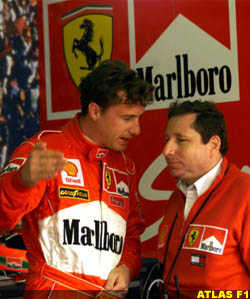 And then there is the rain, which often comes down in torrents at Suzuka, which would arguably be a point in Ferrari's favor given Schumacher's reigenmeister qualities. And then there is the rain, which often comes down in torrents at Suzuka, which would arguably be a point in Ferrari's favor given Schumacher's reigenmeister qualities.
Ultimately, if Ferrari is to win in Suzuka, it will be because the Ferrari Team Manager calls the race correctly, as in Hungary, when Ferrari surprised McLaren with a three-stop pit strategy, which kept the fuel loads light and the Goodyears fresh. Todt & Co. will have to come up with something like the masterstroke in Hungary, perhaps capitalizing on Eddie's strengths as fast off the starting line and putting the two cars on different pit strategies with the objective of keeping Irvine out front or in second place so that at the end of the race he can be of help to Schumacher.
Of course, under the tribal practices of Formula One, if Ferrari really wanted to win they should immediately issue current specification Ferrari engines to Sauber, which currently runs hand-me-down 1997 Ferrari engines badged as "Petronas," Sauber's sponsor, so that Jean Alesi and Johnny Herbert of the Sauber team could improve the chances for a few more cars running up front. By contract, Sauber gets these 1998 spec Ferrari engines for 1999: why not move up the delivery date by one race and surprise its long-suffering customer, Peter Sauber, as well as the opposition...
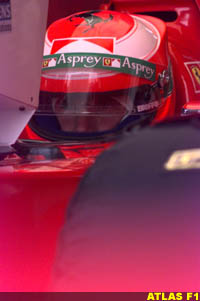 And if all else fails and honorary Schumacher family member Eddie Irvine finds himself unable to live up to the likes of Phil Hill, Peter Collins and Lorenzo Bandini, then it will be left to kid brother Ralf Schumacher, ex officio Ferrari team member pro tempore, to clog up the works to the extent possible, denying places to the McLarens near the front, and thus maximizing big brother Michael's chances. After all, what is Eddie Jordan going to do to Ralf in his last race with the Jordan team if he ends up using his Jordan as if it were a Ferrari in Belgian yellow racing colors: fire him? And if all else fails and honorary Schumacher family member Eddie Irvine finds himself unable to live up to the likes of Phil Hill, Peter Collins and Lorenzo Bandini, then it will be left to kid brother Ralf Schumacher, ex officio Ferrari team member pro tempore, to clog up the works to the extent possible, denying places to the McLarens near the front, and thus maximizing big brother Michael's chances. After all, what is Eddie Jordan going to do to Ralf in his last race with the Jordan team if he ends up using his Jordan as if it were a Ferrari in Belgian yellow racing colors: fire him?
So for all the pained looks of resignation on Michael Schumacher's face at the post-race press conference after the drubbing he took from McLaren at the Luxembourg Grand Prix, Schumacher will have almost as many allies on the grid as Fangio had that day at Monza and, given his own iron will and the talent and resources of his team, he and Fast Eddie stand a good chance of repeating their 1-2 triumph at Monza this year and entering in the record books alongside Fangio, Hawthorn and Surtees as favored sons of Maranello. After years of being in the shadows (and being pushed around by Senna and journalists alike), Eddie Irvine's Warholian 15 minutes as The Man are here: as the Tifosi say, Banzai!
EDDIE IRVINE, BIOGRAPHY
Date of birth: 10th November 1965 GP-Starts: 80
Current age: 32 years Poles: 0
Place of birth: Conlig, Northern Ireland Wins: 0
Resident: Dalkey near Dublin GP-Points: 93
Height: 1,78 m
Weight: 78 kg
Marital status: single
Children: none
Hobbies: Fishing, Flying an Helicopter
Sports: swimming, snowboarding
Favourite music: Rock
Favourite singer: Van Morrison, U2
Favourite food: Chinese
Start of racing career: In 1983 in Irish FF 1600
First racing car: Formula Ford 1600, Crossle 50 F
First success: Winner of the Brands Hatch FF Festival in 87
Most memorable experience: "Winning the FFord Festival in Brands Hatch!"
Career: 1983 Irish FF 1600
1984 Irish FF 1600
1985 British FF 1600
1986 British FF 1600
1987 British FF 1600 Champion,
Winner of Brands Hatch Formula Ford Festival
1988 British Formula 3, 5th,
Winner of first heat F3 Macau GP
1989 F3000/Pacific, 9th
1990 F3000/Eddie Jordan, 3rd
1991 F3000 in Japan, 7th
1992 F3000 in Japan, 8th
1993 F3000 in Japan, runner-up;
F1 Jordan-Hart, 2 races, 1 point, 20th
1994 F1 Jordan-Hart, 6 points, 16th
1995 F1 Jordan-Peugeot, 10 points, 12th
1996 F1 Ferrari, 11 points, 10th
1997 F1 Ferrari, 24 points, 7th
1998 F1 Ferrari, 48 points, 4th after 15 rounds
|







